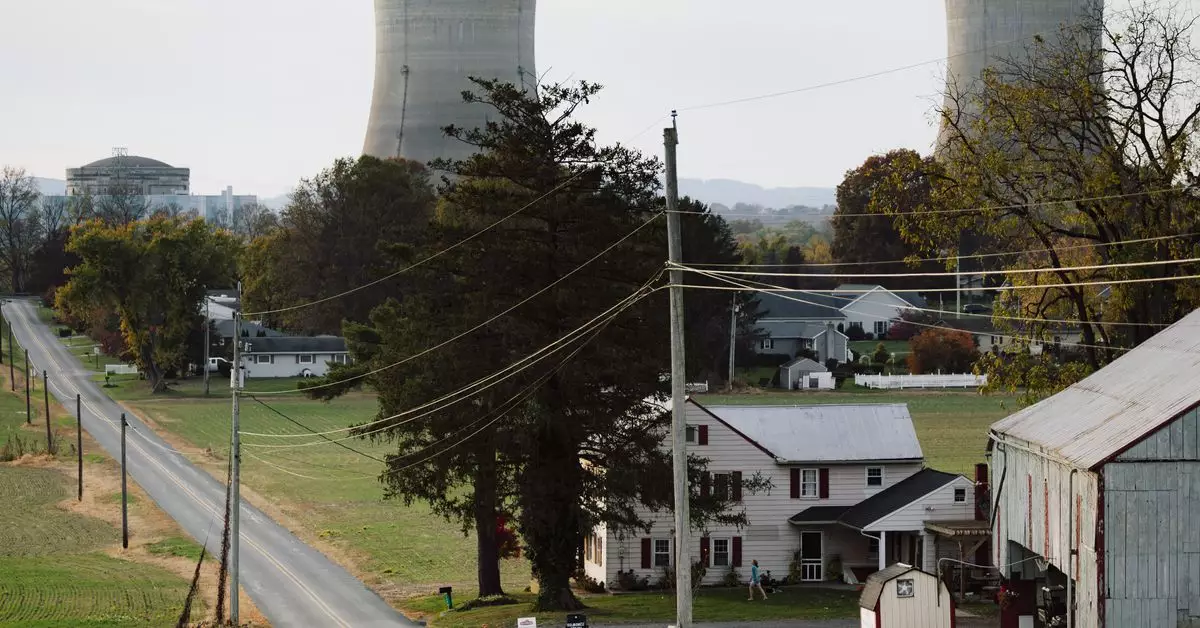The announcement of a groundbreaking nuclear energy contract by the General Services Administration (GSA) signals a pivotal moment in the American energy landscape. With a 10-year commitment valued at $840 million, the GSA has taken a significant step towards enhancing nuclear energy’s role in the U.S. energy portfolio. This contract is expected to produce an impressive 10 million megawatt-hours of electricity, a volume capable of powering over one million homes each year. Awarded to Constellation, a leader in the nuclear energy sector, this contract not only symbolizes a shift in governmental energy procurement policies but also reflects the growing demand for reliable, clean energy amidst surging energy consumption, particularly from burgeoning sectors such as artificial intelligence and data management.
The GSA’s role as the nation’s largest energy consumer positions it uniquely to influence the direction of energy markets. By opting for nuclear energy, the GSA has embraced a cleaner alternative at a time when fossil fuels are under scrutiny for their environmental impact. This contract stands as the most substantial energy procurement agreement in GSA history, marking a deliberate intention to prioritize sustainable energy solutions.
Constellation’s partnership with the GSA is noteworthy for its intent to leverage nuclear technology not just to produce electricity but to innovate and improve existing infrastructures. The contract enables the operator to extend the lifespan of several existing nuclear facilities and invest in upgrades that are projected to add 135 megawatts of capacity. More importantly, this long-term agreement provides the government with budgetary stability and shields agencies from potential price surges in the volatile energy market.
The Corporate Wave Towards Nuclear Energy
Interestingly, the GSA’s initiative comes at a time when major tech firms, including Microsoft, Google, Amazon, and Meta, are increasingly looking to nuclear energy to meet rising energy demands generated by their expansive operations. Microsoft’s collaboration with Constellation, particularly the plan to restart the Three Mile Island reactor, underscores the attraction nuclear energy holds as a reliable and sustainable power source. The convergence of government and corporate interests in nuclear energy not only enhances the viability of such projects but also sets a precedent for future partnerships that could effectively meet energy requirements while addressing environmental concerns.
Joe Dominguez, president and CEO of Constellation, highlighted the changing narrative surrounding nuclear energy. Historically, it has been sidelined in discussions about sustainable energy, but this agreement showcases a shift and renewed investment into a technology once deemed too risky to leverage. This newfound confidence is critical as the nation grapples with both an energy crisis and the pressing challenges posed by climate change.
Nuclear energy represents a significant portion of Constellation’s output, embodying approximately 10% of the nation’s carbon pollution-free energy. The company distinguishes itself with a mix of energy solutions, including hydro, solar, and wind, but it remains clear that nuclear will play an integral role in achieving its ambitious target of 100% carbon-free electricity by 2040.
The GSA contract elucidates an important aspect of nuclear power: its capacity to provide a stable and cost-competitive energy supply. For government agencies, this translates into predictable energy costs and reduced vulnerability to price fluctuations. As energy demands escalate, particularly from advanced technologies and digital infrastructures, the GSA’s decision to secure nuclear energy is both strategic and forward-thinking.
Political and Environmental Considerations
Furthermore, the embrace of nuclear energy aligns with the Biden administration’s energy transition strategies, which seek to diminish reliance on fossil fuels. The commitment to nuclear solutions is not just a matter of energy production but is also crucial in the context of environmental policy. By investing in nuclear energy, the government is effectively working towards fulfilling its climate goals and supporting innovations that reduce the carbon footprint of the energy sector.
The contract reflects a broader shift in national energy policy, positioning nuclear energy as a cornerstone in the fight against climate change. Beyond just the numbers, it signifies a commitment to sustainable practices that can reassure both consumers and environmental advocates.
As the GSA and Constellation unlock the potential of nuclear energy, this contract offers a glimpse into an energy future that prioritizes both sustainability and reliability. It illustrates an emerging consensus among governmental bodies and corporate leaders that, despite past challenges, nuclear power is a necessary player in achieving comprehensive energy solutions. The GSA’s contract not only reshapes federal procurement strategies but also inspires confidence in an industry poised for revitalization amidst an evolving landscape of energy technologies. The path forward will depend on how these partnerships unfold and how committed stakeholders remain to enhancing the role of nuclear energy in America’s quest for a sustainable future.


Leave a Reply